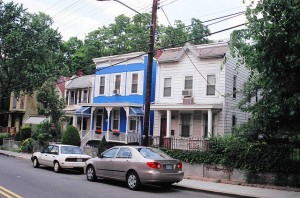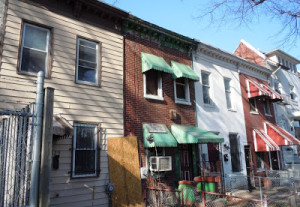“Th e neighborhood doesn’t look that bad…,” I said. There was uncertainty in my voice, trailing off with an unspoken question mark.
e neighborhood doesn’t look that bad…,” I said. There was uncertainty in my voice, trailing off with an unspoken question mark.
To my West Coast eyes, where very few buildings have even turned 100 years old, much of the East Coast had sagging or worn features. It was hard to see a notable difference between the middle class neighborhoods and the struggling areas where my friends did outreach and ministry.
“Look at the cars. That makes it more obvious,” Clark noted, lifting his hand off the steering wheel to gesture at the curb on his right.
It was true, the cars in the neighborhood began looking more beaten down, held together, or rusted out as we drove deeper into the neighborhood.
“Notice the store fronts.” Again, my eyes focused: cheap fried chicken, check cashing joints, mom and pop convenience stores advertising alcohol and cigarettes.
I nodded my head and looked silently out the window.
Days earlier, I had phoned Clark to ask if I could come visit his missionary community, A Simple House, for Holy Week. I aimed for casual but failed miserably. Rather, I called every twenty minutes until he answered. If it was going to work, I needed to buy a last-minute ticket from Tucson to Reagan Airport in DC. I spit out my request, over-talking and rambling. After an awkward pause, he responded with uncertainty. Nonetheless, I needed the “yes.” I logged onto the computer and bought the ticket.
I was grieving. Numb. Zoned out. Uncertain about how to face the future.
When I received the news of my brothers’ tragic and sudden death, I was traveling for work. In the weeks that followed, I thought of nothing else than immediate needs. Fly home. Be with family. Plan arrangements. Communicate details. Deal with logistics.
But, weeks had passed since that phone call and gentle probes about when I would return to my duties were creeping into the occasional conversation. I was the leader of a mid-sized nonprofit in the midst of growth. While the others were happy to cover for me, they were starting to feel my absence.
The idea of shouldering the responsibility of my life of ministry was more than my fragile, weepy self could imagine. Fundraising. Drama-filled scenarios. Financial statements. Staffing issues. The mere thought sent me whirling.
But, the hugs had been hugged. The cards had been opened and the food from the refrigerator cleaned up.
It was time to return to “normal life.”
In my mind, visiting my friends and colleagues with A Simple House was an inbetween place, a way of tiptoeing back into my life. I could be surrounded by ministry but not responsible for decisions, or finances, or saying the right thing. I could show up to all of the liturgies of the holy season without having to face the spoken or unspoken question: “How are you?” I didn’t know which I was more afraid of, the people who were unable to bring it up or those who did. I could be surrounded by people who I knew but would be able to leave, people with full lives who cared but didn’t coddle. I could still be messy and irrational and unraveled without causing concern.
As I walked into the house, one of the missionaries, Laura, welcomed me with a hug, trying to gauge my emotion. Moments later, her co-worker, Ryan appeared in the hallway. In a few sentences he shared about his experience of death in his immediate family, a conversation that we picked up later in the visit. Whatever he said allowed me to exhale. It was okay that I was here. It was weird but, it was okay. My grief didn’t make me a burden. They would work me into their life for a few days.
And they did.
Over the course of my visit, I heard stories of suicide and murder, of incest and sexual assault. Stories of generations of pain and heroic struggles to mount obstacles. Indications of tiny steps forward and huge slides backward.
On Easter morning, in my Easter best, I stood shoulder-to-shoulder with my friends in the pew of the small African-American parish. I was standing among a suffering people. I was a suffering person.
The choir wasn’t perfectly musical but they were singing from their lives–the burden of sin, the joy of redemption, the hope that sustains. Their impassioned tones broke into my numbness. From the somber reality of death and disappointment and illness and unemployment and addiction, there was praise. It was chosen and it was gift. Praise.
With my hand extended to the sky and tears running down my cheek, I joined in.
We rejoiced that death was not victorious. We celebrated the light, the new life that was promised and given.
As the liturgy ended, we walked out to the parking lot, full of cars in disrepair, and climbed into the ministry minivan decked out with its share of  dings and dents. I gazed out of the window, quietly watching the weary neighborhood, with its sagging porches and bedraggled lawns.
dings and dents. I gazed out of the window, quietly watching the weary neighborhood, with its sagging porches and bedraggled lawns.
I could see the ugliness.
But, I knew there was life inside.
Author’s Note: This piece is dedicated to the memory of Dave Bender who sold many a car that was beaten down, held together, and rusted out on my behalf. He would leave with a car on it’s last legs and return with a few hundred dollars. It was a hidden act of service that Dave did without fanfare or recognition for years and years. May you be surrounded in the glory of His love, my friend. Thank you for your service.

Oh, Mary. This story is why we tell stories.
To be welcomed in all grief and brokenness–what a gift. And such a lovely reflection on serving others from a place of vulnerability.